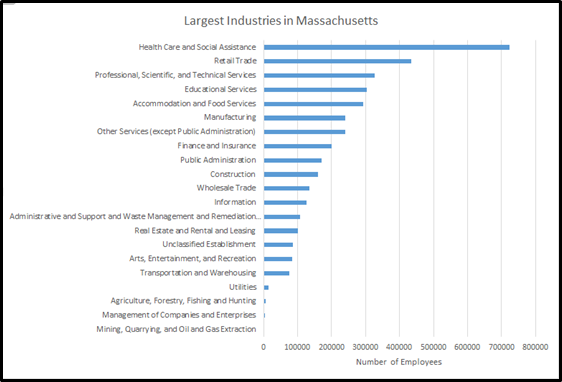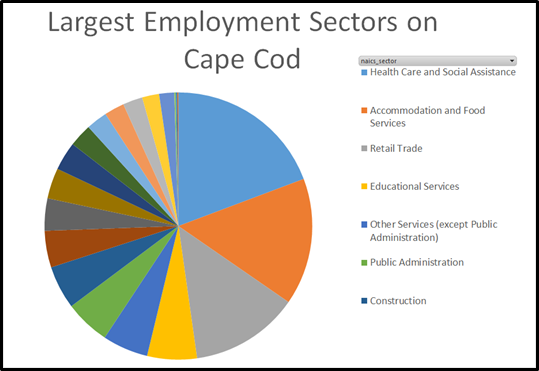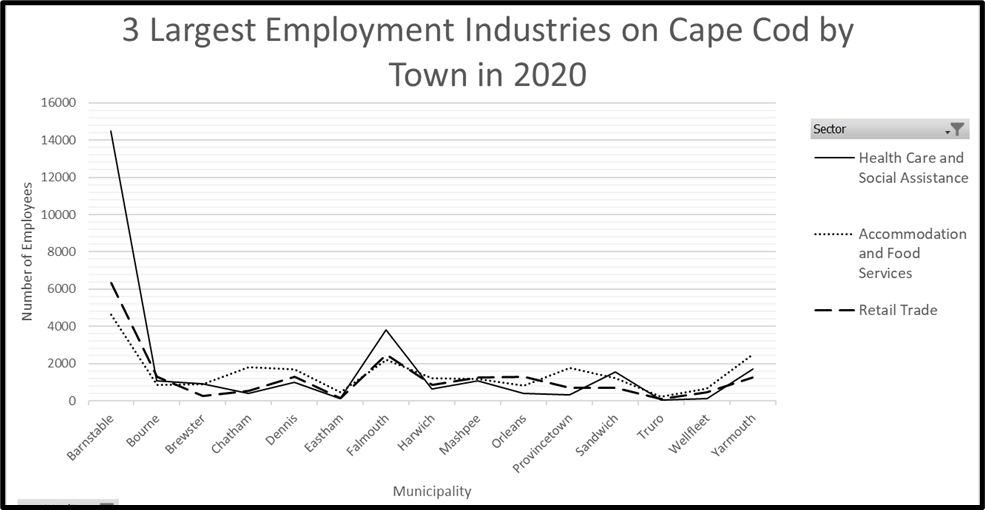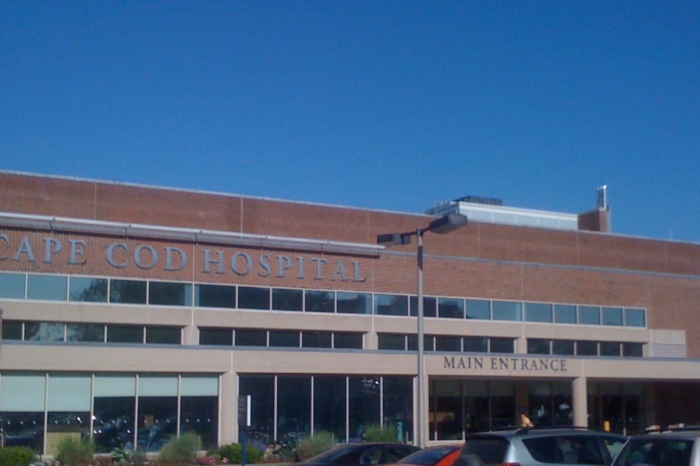Healthcare Employs More on Cape Cod Than Any Other Sector
It should come as no surprise that healthcare is the biggest employment sector in Massachusetts. After all, Boston’s hospitals are world famous. But how is it that the healthcare sector dominates a major tourist destination like Cape Cod?
Industry Sectors in Massachusetts
According to data available at the Pioneer Institute’s MassEconomix website, the three largest sectors by employment in Massachusetts are “Healthcare and social assistance,” “Retail Trade,” and “Professional, Scientific, and Technical Studies” (See Figure 1).
The healthcare sector employs 722,988 people, or about 19 percent of all employees in the State. It also has more than twice as many employees as any other sector except retail. Therefore, it is clear that healthcare dominates the Massachusetts economy from an employment perspective.

Figure 1: “Healthcare and social assistance” employs significantly more than any other sector in Massachusetts. This finding is not surprising because Boston is a major hub for the medical field and because of the high cost of healthcare. The author created this chart using data from 2020 available on the Pioneer Institute’s MassEconomix website.
Highlighting Cape Cod
Accommodation and food service is a major sector on Cape Cod, but surprisingly, not the largest. Instead, healthcare takes the top spot!
There are 27,564 people employed in the Cape’s healthcare sector, followed by 21,988 in accommodation and food services, and only 18,800 in retail trade (See Figure 2 below). The number of people employed in the Cape Cod healthcare sector is equal to 12 percent of the 228,996-person population of Cape Cod (US Census, The Cape Cod Commission).
The accommodation and food services sector encompasses many of the factors that contribute to a vacation on Cape Cod, including bars, restaurants, hotels, and traveler accommodations, among other industries. The largest employment industry within accommodation and food services is restaurants, which employ 15,313 people, 70 percent of the sector.
The healthcare sector is broken down into four sub-sectors: ambulatory care facilities, hospitals, social assistance, and nursing and residential care facilities. Sixty percent of the healthcare sector on Cape Cod is ambulatory services which includes primary care doctors, dentists, chiropractors, and optometrists among others.

Figure 2: A pie chart showing the relative size of employment sectors on Cape Cod. Sector definitions are standardized by the US Census Bureau through a classification system called the North American Industry Classification System (NAICS). The author created this chart using data from 2020 available on the Pioneer Institute’s MassEconomix website.
One town, Barnstable, houses over half the healthcare employees on Cape Cod, even though it only accounts for 31 percent of employment. In most towns on the Cape, healthcare is not the largest employment sector. It is only the largest sector in Barnstable and Falmouth (See Figure 3 below).
Cape Cod Hospital contributes to the size of the healthcare sector in Barnstable, being the largest medical facility in the region. Cape Cod Healthcare, the entity that operates Cape Cod Hospital and Falmouth Hospital, employs over 5,300 people, according to its website.

Figure 3: A line graph showing the three largest sectors on Cape Cod by employment. The town of Gosnold does not appear on this graph because of incomplete data. The author created this chart using data from 2020 available on the Pioneer Institute’s MassEconomix website.
Will the Healthcare Sector Grow Even More?
Cape Cod’s healthcare sector may seem surprisingly large and even eclipses its accommodation and food service sector. This may be a good thing for healthcare workers wanting to work on beautiful Cape Cod. It might also be good for people needing urgent medical care.
But is it a good sign for the future of the Cape? The median age in Barnstable County, which makes up Cape Cod, is 53.9 years, while the median age in Massachusetts is 39.4 years. An aging population helps to explain why there are so many people employed in healthcare on the Cape.
It is also worth wondering how Cape Cod’s healthcare sector fits into national trends in healthcare. The US has an aging population that has led the US Bureau of Labor Statistics (BLS) to estimate that the healthcare industry will grow 16 percent during this decade (BLS.gov).
Cover Image Credit: Davee (OwlMonkey) uploaded from Wikipedia.
About the Author:
Joseph Staruski is a government transparency intern with the Pioneer Institute. He is currently a Master of Public Policy Student at the University of Massachusetts, Amherst. He was previously an opinions columnist with the Boston College student newspaper The Heights and an Intern with the Philadelphia Public School Notebook. He has a BA in Philosophy and the Growth and Structure of Cities from Haverford College. Feel free to reach out via email, linkedin, or write a letter to Pioneer’s Office in Boston.

 This file is licensed under the Creative Commons Attribution 2.0 Generic license.
This file is licensed under the Creative Commons Attribution 2.0 Generic license. 
